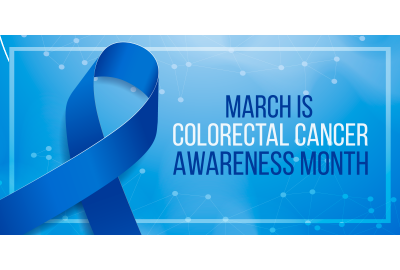March is Colerectal Cancer Awareness Month, and we wanted to shine the spotlight on one of the less-talked about forms: colorectal cancer. Colorectal cancer is the fourth most common cancer in men and women, so it’s worth having a conversation about.
What is Colorectal Cancer
 Colorectal cancer, often referred to as bowel cancer, is a type of cancer that begins in the colon or rectum. The development of cancerous cells often begins as small, noncancerous polyps that can turn cancerous over time.
Colorectal cancer, often referred to as bowel cancer, is a type of cancer that begins in the colon or rectum. The development of cancerous cells often begins as small, noncancerous polyps that can turn cancerous over time.
The initial stages of colorectal cancer may be asymptomatic. When displayed, symptoms may include changes in bowel habits, blood in stool, abdominal discomfort, unexplained weight loss, and fatigue.
Causes and Risk Factors
Certain lifestyle choices, such as a diet high in processed meats, smoking, excessive alcohol consumption, and lack of physical activity, can elevate the risk.
Genetic factors, family history, and age can contribute to an increased risk of colorectal cancer. For example, individuals over the age of 50 face significantly higher risk of colorectal cancer.
Prevention and Screening
Adopting a healthy lifestyle, including a balanced diet and regular exercise, can lower the risk. Screening tests like colonoscopies and fecal occult blood tests are essential for early detection.
Diagnostic procedures, including imaging tests and biopsies, help confirm the presence of colorectal cancer. Regular screening, especially for individuals with risk factors, is key to early detection and successful treatment.
Communication is Key
Studies indicate the reluctance to discuss colorectal cancer—more so than others. It’s worth noting that about 20% of all colorectal cancer patients have a close family member who has had colorectal cancer, so educating other members can be a crucial preventative measure. While it may be uncomfortable, the conversation may also be life-saving.
Colorectal cancer is a formidable health challenge, but early detection and advancements in treatment options have significantly improved outcomes.
By understanding the risk factors, recognizing symptoms, and prioritizing regular screenings, individuals can take proactive steps towards preventing and managing colorectal cancer.
Disclaimer:
This blog aims to provide a comprehensive overview of colorectal cancer and is for informational purposes only. This article is not intended to treat, diagnose, or be interpreted as medical advice.






